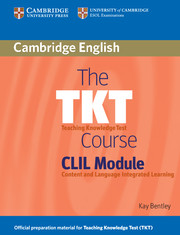Unit 6 - Planning a lesson or a series of lessons
Published online by Cambridge University Press: 27 September 2023
Summary
How do we plan a CLIL lesson or series of lessons?
Before we can plan a CLIL lesson or series of lessons, we need to be clear about our CLIL contexts and teaching aims. We need to identify the content knowledge and skills which learners will be taught. We also need to consider the different stages of the lesson and the sequence of a series of CLIL lessons.
Key concepts
In order to focus on the learner rather than the teacher, learning outcomes are often used. These are statements of what most learners should be able to know, be able to do and be aware of as the result of a learning experience. This can be at the end of a lesson, a series of lessons, a unit or module (part of a course). Learning outcomes can be wide or narrow but they need to be achievable and measurable. For example:
Learning outcomes also focus on learning to learn. An example is: to be able to give peer feedback to help improve someone's work.
There are many advantages of using learning outcomes. For teachers: they help describe courses clearly; they provide continuity; they focus on whole class, group and individual needs; they guide the design of tasks; they can be used as a checklist for feedback; they make assessment clear.
For learners: they are learner centred; they show what should be achieved; they help learners have goals so they can check progress; they enable differentiation (making provision for less able and more able learners).
When planning, we also need to consider the following questions:
What are my teaching aims?
What will the learners know and be able to do at the end of the lesson which they didn't know or couldn't do before the lesson?
What subject content will the learners revisit and what will be new?
What communication will take place?
Which thinking and learning skills will be developed?
What tasks will learners do?
What language support will be needed for communication of content, thinking and learning?
Which materials and resources will be provided to present the content and support any tasks?
- Type
- Chapter
- Information
- The TKT Course CLIL Module , pp. 30 - 36Publisher: Cambridge University PressPrint publication year: 2010

